|
|
|

Editorial
Board
London Editor:
(London UK)
Melanie
Eskenazi
Regional Editor:
(UK regions and Worldwide)
Bill
Kenny
Webmaster:
Bill
Kenny
Music Web Webmaster:
Len
Mullenger



|
MusicWeb is a
subscription-free site
Clicking Google adverts on our pages helps us keep it that way
Seen and Heard International Festival Review
Tiroler Festspiele 2007:
Wagner, Der Ring des
Nibelungen
and
Tristan und Isolde. Soloists of the Accademia
di Montegral, the Tiroler Festspiele Orchestra and
Chorus, Gustav Kuhn (conductor) Passionsspielhaus,
Erl Austria, 14-21.7. 2007
(BK)
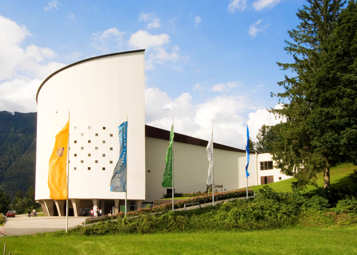
The 'Passionsspielhaus',
Erl
For nine of the past
ten years, ever increasing numbers of
discerning Wagnerites from all
over the world have been flocking to
the small Tirolean village of Erl
during July. Once there, they spend a
week in the village's pretty but
uncomfortable Passionsspielhaus to see
opera productions staged and conducted
by Professor Gustav Kuhn, the
human dynamo described by Austrian
television in 2005 as 'The Iron Man of
Culture.' Some visitors return
annually, which considering the
hardness of the hall's seats and this year's
daily temperatures - up to
36 ° C for two days - may seem
little short of
remarkable. Unless you've been there,
that is: this festival is
unique.
What you get in Erl is a musical
experience completely unlike any
other. There's a hundred strong
orchestra perched precipitously
behind the singers, there's a fifty
strong chorus cramming the stage in
Götterdämmerung and in the average
Ring performance there'll
be multiple Brünnhildes, Wotans and
Siegfrieds. And there's Gustav Kuhn
himself of course, personally
responsible for the general direction
of the festival, for most of the stage
direction and lighting and for 98% of
the conducting, which this year
included a cycle of Brahms
symphonies as well as a Ring,
Tristan and Parsifal.
Those who sneer at Domingo for
'compulsive over-achievement' have
clearly never met this man.
All
of this comes about because Kuhn is
both extraordinarily gifted and
astonishingly energetic. Born in Salzburg, he began music
lessons at 5 and studied composition
and conducting in both Salzburg and
Vienna taking finals in 1970. At
exactly the same time though, he
finished a Ph.D in
philosophy, psychology and
psychopathology in between studying
conducting with Bruno Maderna and
Karajan and winning a battery of
conducting prizes along the way.
After pursuing his conducting career
for twenty years or so with an
impressive list of first rank
orchestras, and then taking up stage
directing in 1986, Gustav Kuhn
founded his 'Accademia
di Montegral' in 1987 at Lucca in
Tuscany. The 'Accademia' was intended
as a refuge where young musicians,
stage directors and costume designers
could study, free from the commercial
pressures of modern artistic life and
it soon attracted an impressive number
of expert 'Associates' as tutors and
mentors. Since the Accademia stresses
the importance of actual professional
practice in real performance settings
as well as study, the launch of the
Tiroler Festspiele in 1997 was a
logical development to the activities
in Lucca. Many young artists have
passed through Gustav Kuhn's tutelage
since then, including the
Finnish bass-baritone Juha Uusitalo
who said that singing Wotan in Erl was
a huge boost to his career when I
interviewed him in Helsinki last year.
(Interview
here.)
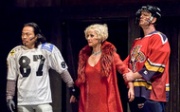 |
|
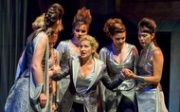 |
|
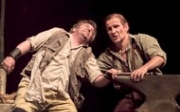 |
|
Das Rheingold |
Die
Walküre |
Siegfried |
The festival theme for 2007 was 'Wagner's Ring in Seven
Parts', a title which actually meant
that over the course of a week a
Ring Cycle interspersed with a
performance of Tristan and Isolde,
two dramatic readings of the entire
text of Die Meistersinger and a
closing performance of
Parsifal were offered
in chronological order of composition.
Each staged opera performance had the
usual Erl mix of up-and-coming young
singers assisted by more seasoned
professionals.
No-one goes to Erl for spectacular
productions however. The available
stage space is very restricted and
consequently, room for manoeuvre
is very limited especially for the
elements requiring large numbers of
singers on stage simultaneously. Sets
are necessarily very basic -
there is no grid from which to fly
scenery for example- and in one sense
innovative production concepts are
essentially impossible. More
importantly though, they are largely
irrelevant.
No, the thing that attracts
returning audiences to Erl is the
wonderful sound that Gustav
Kuhn draws from his orchestra, the extrordinarily clear acoustic in the
1500 seat hall and the
freshness of new voices supported by
seasoned stalwarts - of which Robert
Hale, Phillip Joll (Wotans) and Jürgen
Müller and Gianluca Zampiere (Siegfrieds)
were just four examples this year.
Each of the three Brünnhildes (Elena
Comotti d'Adda, Bettine Kampp and
Brigitte Wohlfarth) sang with
power and assurance despite the high
temperatures and rather than causing
a distraction, the cast changes
made as the cycle progressed added interest
due to differences in vocal timbre,
appearance and personal styles of
acting. Particularly great
performances from the stalwarts -
Gertrud Ottenthal (Sieglinde, Gutrune)
Martina Tomcic (Fricka) and Monika
Waeckerle (Waltraute) were
supplemented by some exceptionally
rich singing from Svetlana Sidorova as
Erda. Andrea Silvestrelli - a
rich and sonorous true bass - offered
one of the most menacing Hagens to be
seen anywhere and the imported
Gibichung chorus was splendidly
impressive.
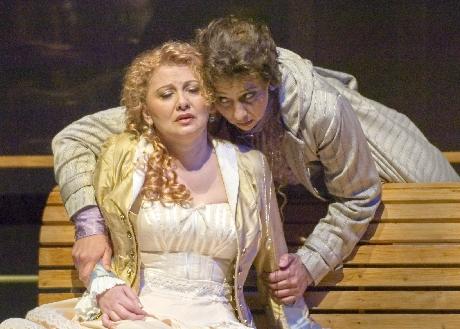
Michela
Sburlati (Isolde) and
Monika Waeckerle (Brangäne)
That
Gustav Kuhn has developed into an
exceptionally fine Wagner conductor
- a quality shown throughout the
whole Ring - was underlined firmly by
his reading of Tristan und Isolde,
the only other work I was able to
see during the festival's second week.
It is fair to say that in Act I
particularly, the wealth of detail
revealed by Dr Kuhn's fairly brisk
reading was as fine as I can remember
- and that includes the Stockholm
production from
2004 with Nina Stemme as Isolde.
If
the singing didn't quite meet the same
standard with the exception of Monika
Waeckerle's Brangäne and Kurt Rydl's
magisterial King Marke, then just for
once it really is fair to blame that
on the heat in the hall.
Gianluca
Zampiere and Michela Sburlati in the
title roles did their joint best but
hampered as they were by elaborate
heavy costumes, it would have
been nothing short of miraculous if
they had produced world class
performances on this occasion.
2008 is
a Passion Play year in Erl and the
festival moves to the nearby town of
Kufstein where there is a particularly
impressive castle. That will probably
be as interesting musically as ever
but the Erl cognoscenti will doubtless
be pining for the discomforts and
delights of the Passionsspielhaus.
They'll be right to do so: nowhere
else could ever have Erl's
magic. Or Erlkönig
Kuhn, as my colleague Glyn Pursglove
points out.
Bill Kenny
All pictures © Rupert Larl and the Tiroler
Festspiele
Back
to the Top
Back to the Index Page
|
Seen and Heard, one of the longest established live
music review web sites on the Internet, publishes original reviews
of recitals, concerts and opera performances from the UK and internationally.
We update often, and sometimes daily, to bring you fast reviews,
each of which offers a breadth of knowledge and attention to performance
detail that is sometimes difficult for readers to find elsewhere.
Seen and Heard
publishes interviews with musicians, musicologists and directors
which feature both established artists and lesser known performers.
We also feature articles on the classical music industry and we
use other arts media to connect between music and culture in its
widest terms.
Seen and Heard
aims to present the best in new criticism from writers with a radical
viewpoint and welcomes contributions from all nations. If you would
like to find out more email Regional
Editor Bill Kenny. |
|
| |
|
Contributors: Marc
Bridle, Martin Anderson, Patrick Burnson, Frank Cadenhead, Colin
Clarke, Paul Conway, Geoff Diggines, Sarah Dunlop, Evan Dickerson
Melanie Eskenazi (London Editor) Robert J Farr, Abigail Frymann,
Göran Forsling, Simon Hewitt-Jones, Bruce Hodges,Tim Hodgkinson,
Martin Hoyle, Bernard Jacobson, Tristan Jakob-Hoff, Ben Killeen,
Bill Kenny (Regional Editor), Ian Lace, John Leeman, Sue Loder,Jean
Martin, Neil McGowan, Bettina Mara, Robin Mitchell-Boyask, Simon
Morgan, Aline Nassif, Anne Ozorio, Ian Pace, John Phillips,
Jim Pritchard, John Quinn, Peter Quantrill, Alex Russell, Paul
Serotsky, Harvey Steiman, Christopher Thomas, Raymond Walker, John Warnaby,
Hans-Theodor Wolhfahrt, Peter Grahame Woolf (Founder & Emeritus
Editor)
|
Site design: Bill Kenny
2004 |

